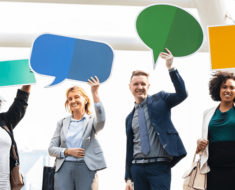
Unsplash
Social intelligence is a valuable skill that plays a crucial role in our personal and professional relationships. It involves the ability to understand and navigate social situations effectively, communicate clearly, and build strong connections with others. While some individuals seem naturally adept in social settings, social intelligence can be developed and improved through intentional efforts. Below, we will explore practical strategies to enhance your social intelligence and thrive in social interactions.
Cultivate Empathy and Active Listening
Ever left asking yourself, ‘why am I socially awkward?’. Empathy and active listening are two essential components of effective communication and interpersonal skills that you might be missing. They play a crucial role in building strong relationships, fostering understanding, and promoting a sense of connection and empathy with others. These two skills are fundamental in increasing social intelligence:
- Practice putting yourself in others’ shoes, attempting to understand their perspectives, and recognizing their emotions.
- When engaging in conversations, give your full attention, maintain eye contact, and respond empathetically. Show genuine interest by asking open-ended questions and paraphrasing to demonstrate understanding.
Develop Emotional Intelligence
Emotional intelligence refers to the ability to recognize, understand, and manage our own emotions and the emotions of others. It involves being aware of our feelings, accurately perceiving emotions in ourselves and others, using emotions to guide thinking and decision-making, and effectively managing emotions in various situations. Emotional intelligence is a valuable skill that influences our relationships, personal well-being, and overall success in life. It plays a vital role in social interactions and can massively enhance social intelligence. To develop your emotional intelligence, you can:
- Increase self-awareness by reflecting on your emotions, triggers, and responses in different situations.
- Learn to regulate your emotions effectively by practicing stress-management techniques – like deep breathing or mindfulness.
- Develop empathy and understanding for others’ emotions by observing their facial expressions, body language, and verbal cues.
Enhance Nonverbal Communication
Nonverbal communication refers to the transmission of messages through nonverbal cues, such as body language, facial expressions, gestures, and tone of voice, rather than through spoken or written words. It is a fundamental aspect of human communication and plays a crucial role in conveying emotions, attitudes, and intentions.
Nonverbal cues can complement, reinforce, or contradict verbal communication, providing additional context and depth to the message being conveyed. They are often more immediate, powerful, and influential than words alone as they tap into unconscious and intuitive aspects of human interaction.
By becoming more aware of our nonverbal cues, we can enhance our social intelligence. You can improve your nonverbal communication by:
- Ensure you focus your attention on your body language, ensuring it aligns with your words. Maintain an open posture, make appropriate gestures, and maintain eye contact.
- Monitor your tone of voice, using a friendly and engaging tone to convey warmth and interest.
- Examine and decipher nonverbal cues of others, such as their facial expressions and body language, to better understand their emotions and responses.
Sometimes, nonverbal communication and someone’s body language can be the difference between the tone of a conversation. It’s very obvious when someone is angry, sad, or tired during a conversation by looking at body language or nonverbal cues.
Practice Effective Communication and Social Skills
Effective communication and social skills are essential for building positive relationships, fostering understanding, and achieving successful interactions in various contexts. These skills enable individuals to express themselves clearly, listen actively, and navigate social situations with confidence and empathy. The key to a higher level of social intelligence is understanding what type of communication to use in different situations and how to use them.
By honing these skills, you can increase your social intelligence and improve your interactions. You can improve your communication and social skills by:
- Develop clear and concise communication by organizing your thoughts before speaking, using appropriate language, and avoiding jargon or complex terms.
- Practice assertiveness by expressing your thoughts, needs, and boundaries confidently and respectfully.
- Enhance your conversational skills by being an active participant, contributing relevant insights, and showing curiosity and engagement in the topic.
Social intelligence is a skill that can be developed and improved with practice and intention. By cultivating empathy and active listening, developing emotional intelligence, enhancing nonverbal communication, and practicing effective communication and social skills, you can increase your social intelligence and navigate social interactions with ease. Remember that building social intelligence is an ongoing process – it’ll take time and effort.
Embrace opportunities to learn from each interaction and continually refine your skills. As you enhance your social intelligence, you will experience stronger connections, improved relationships, and greater success in various areas of your life.












